Chaos Reigned: An Oral History of the 2008 800m Olympic Trials Final
Kevin Sully | On 27, Jun 2016
Photo: Randy Miyazaki / TrackandFieldPhoto.com
As the noise descended from the bleachers at Hayward Field and penetrated underneath the west grandstand, Tom Pappas abandoned his warm-up. Pappas was minutes away from the last event of the decathlon at the 2008 Olympic Trials — a 1500m run that was the only remaining obstacle between him and his third straight Olympic team. But the men’s 800m was on the track and the volume was reaching levels that were impossible to ignore.
“Your whole focus is on making the team and here we are caught up in the 800.” Pappas said. “I kind of got lost in the moment.”
They weren’t alone. Pappas and his fellow decathletes headed toward the finish line where they stumbled into a front row seat for one of the most memorable races in the history of Hayward Field.
The crowd of almost 21,000 screamed as three runners who trained in Oregon finished 1-2-3. Nick Symmonds crossed the line first, flexing his biceps after an emphatic last 150 meters. 20-year-old Andrew Wheating, who was wearing a puka shell necklace and a dazed look, kicked hard for second. For the final Olympic spot, Christian Smith and Khadevis Robinson dove across the line with Smith getting there .06 seconds quicker to ensure the Oregon sweep.
“It was so loud,” said Tom Heinonen, University of Oregon’s coach from 1975-2005. “For an instant, it hurt.”
Eight years after the race, I spoke with seven of the eight finalists, as well as others who were at Hayward Field on June 30, 2008. All participants are listed with their role during the 2008 Olympic Trials. Some responses have been edited for brevity and clarity.

Anderson: It was just so perfect in so many ways. Nick was so dominant and Andrew shocking himself — I don’t think he ever thought he would get second, I don’t know. And then the dive across the finish line was just crazy.
 Wheating: There’s never going to be a race in my life that will ever have the same meaning to me as that race does.
Wheating: There’s never going to be a race in my life that will ever have the same meaning to me as that race does.
 Lananna: It had all the actors in place for this grand play and all of a sudden it started to unfold step by step, by step.
Lananna: It had all the actors in place for this grand play and all of a sudden it started to unfold step by step, by step.
 Smith: It’s pretty nostalgic. It feels like it was a really, really long time ago at this point and it makes me wish it was happening just yesterday.
Smith: It’s pretty nostalgic. It feels like it was a really, really long time ago at this point and it makes me wish it was happening just yesterday.
 Gagliano: It was a story in itself about Christian. But it was a story in itself when you had Symmonds and Andrew and Christian make the Olympic team and all from one town–Eugene. Story in itself.
Gagliano: It was a story in itself about Christian. But it was a story in itself when you had Symmonds and Andrew and Christian make the Olympic team and all from one town–Eugene. Story in itself.
Anderson: I would just say that it just cemented Track Town USA…reestablish Eugene’s status as Track Town USA.
Lananna: I was hired here on July 5th (2005) and I flew to Helsinki two or three weeks later to discuss with USA Track and Field that we were serious about putting a bid in (for the Olympic Trials).
Anderson: There was a lot of optimism and a feeling that big things were on the horizon, and I think the Trials was sort of the catalyst behind all of it. I remember I thought the bid was dead and then it got revived and we got the Trials and all this positive energy started happening and it was pretty exciting.
Lananna: It was this asset and we felt — if we could just dust it off and restore it — and I felt the best place to get it was to go after the best meet — go after the best, biggest you could possible get.
Wheating: Being my coach, he would talk about how great the Trials were going to be back in Eugene and how lucky you are to be a Duck — it’s so cool to be racing here.
He really infused this excitement and confidence — running at Hayward Field with Trials here is going to be this rock concert of a show. Vin knows, and he gets it, and that’s what he put together. I kind of saw it coming that he was going to put together this unbelievable show that people weren’t going to forget. I didn’t think I was going to be a part of it, in that way…
Lananna’s arrival at the University of Oregon also ushered in the Oregon Track Club Elite to Eugene in 2006. The group was headed by veteran coach Frank Gagliano and featured post-collegiate runners like Nick Symmonds.
 Symmonds: In ‘06 I finished second at the US Championships It was the first 800 I’d lost in seven years, and that’s really the race that launched my pro career. Finishing second in the US, I said, “Well, all I have to do is stay as good as I am right now and I’ll be an Olympian.” I figured I didn’t even have to improve any, if I just continued to be second in the US I’d be an Olympian in two years. I decided to invest everything I had into training full-time and do just that, and in 2007 I was able to progress a little bit, I won Pre Classic.
Symmonds: In ‘06 I finished second at the US Championships It was the first 800 I’d lost in seven years, and that’s really the race that launched my pro career. Finishing second in the US, I said, “Well, all I have to do is stay as good as I am right now and I’ll be an Olympian.” I figured I didn’t even have to improve any, if I just continued to be second in the US I’d be an Olympian in two years. I decided to invest everything I had into training full-time and do just that, and in 2007 I was able to progress a little bit, I won Pre Classic.
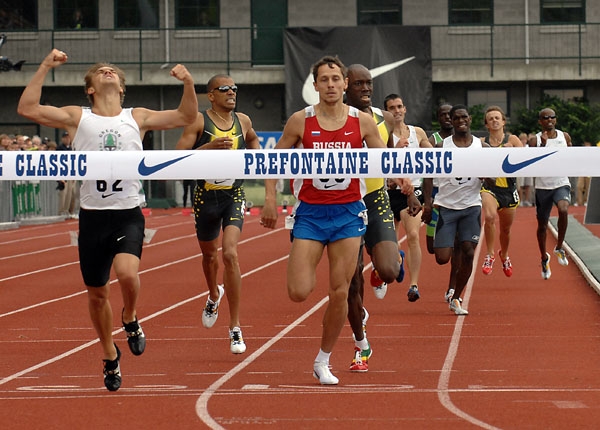
Nick Symmonds winning the 2007 Pre Classic 800m over 2004 Olympic champion, Yuriy Borzakovskiy. (Photo: Randy Miyazaki/TrackandFieldPhoto.com)
Anderson: His breakthrough at the ‘07 Pre Classic, that sort of cemented him as the face of Oregon Club Elite and he sort of became the hometown hero that Eugene hadn’t had for a while.
Gagliano: He had tremendous speed for not a big man. But I really got to know him when he beat Borzov (Yuriy Borzakovskiy) in the Prefontaine.
He beat him and…everyone knew Nick then. Tremendous wallop the last 100. Don’t count him out, know what I mean. He’s going to go to the back, but he’s going to come.
In 2007, Christian Smith moved from Kansas to join OTC. Smith was an All-American mid-distance runner at Kansas State where he won the NCAA Indoor Championship in the mile in 2006. His transition to professional running was complicated by a burst appendix in 2007. He competed just once that season.
Smith: One of the things I appreciate about being in Oregon so much was Coach Gags (Gagliano) being able to do what was best for me, not necessarily the group — for each individual athlete he’s concerned with. I was not doing well with the training. I had a terrible indoor season (2008). I went to Penn Relays and was terrible and I wasn’t really seeing any results from the change in training. At that point my college coach (Mike Smith) started writing all my workouts and then Gags was implementing the workouts. So he saw I was struggling and went back to what I was successful at.
Gagliano: He came to me at the end of February and he wasn’t happy the way he was progressing, and he asked if his college coach, who is the present coach of West Point right now, could really help with workouts and so forth because he really was not happy. And I said be patient and you’re doing very well. This is a new system.
I took the workouts that Christian gave me and I’m going to be up front with you — most of them were his college coach’s, and from March, April, May and June and we would do his workouts. And he would do some of the workouts with us, but he was really concentrating on his college coach’s workouts.
Was I happy with it? No. But here is a man that came with us and wanted to make our Olympic team and so forth, and I said, “Well fine, you know?”
 Solomon: Just coming into that year, I was coming off a high because that previous year I made the World team. So, my confidence was pretty high. But then going into the year, I was racing a lot with Andrew Wheating, because he was in our conference. Every time that me and him would race, he would beat me, so that was on my mind at the time of the Trials.
Solomon: Just coming into that year, I was coming off a high because that previous year I made the World team. So, my confidence was pretty high. But then going into the year, I was racing a lot with Andrew Wheating, because he was in our conference. Every time that me and him would race, he would beat me, so that was on my mind at the time of the Trials.
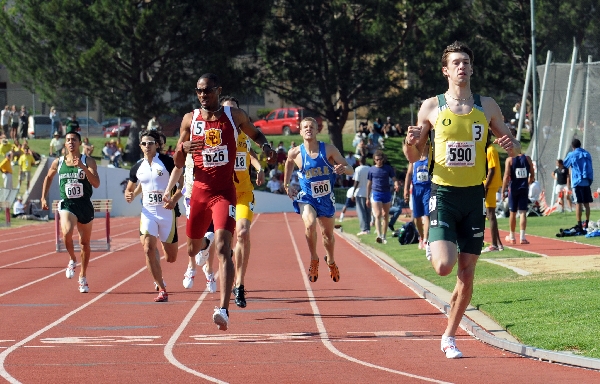
Andrew Wheating defeating Duane Solomon at the 2008 NCAA West Region Championships. (Randy Miyazaki / TrackandFieldPhoto.com)
Wheating: That whole entire year itself was just an absolute roller coaster of emotions. The year before, I was contemplating leaving Oregon. I was kind of going through that freshman year depression — going to school across the country, I had not seen my family.
So I was really unsure what to expect of myself, and then, I remember, there was an indoor race where it just really clicked, and I won. I ran a personal best; I went under 1:50 and, all of a sudden, things started to come together. Each race was a little better than the last one. My kick was really starting to develop. I was running a lot faster, and then we hit outdoors. I lost NCAAs by a hundredth of a second, but I ran 1:45 which was a huge personal best for me.
Lananna: In the beginning this was all new. It’s the most unlikely thing that this guy from Norwich, Vermont, that really didn’t know a whole heck of a lot about track and field shows up his freshman year and scores a couple points in the Pac-(10s) as a freshman and then just gets better and better and better during the season.
Anderson: I felt pretty confident that Nick was going to make the team. To be honest, I thought he was the favorite just because he was running so well and it was his home turf. And he was so strong, and he could run the rounds better than anybody and Khadevis (Robinson) had been at the top for a while, and I respected him and I figured he would be the one to really push Nick.
 Robinson: Leading up, I had a race at the Prefontaine Classic (three weeks before the Trials) and I was in extremely, extremely good shape. I thought I was going to go there and run crazy fast, and I went and I didn’t execute my race. I just didn’t. And I ran well, I think I ran 1:44 something.
Robinson: Leading up, I had a race at the Prefontaine Classic (three weeks before the Trials) and I was in extremely, extremely good shape. I thought I was going to go there and run crazy fast, and I went and I didn’t execute my race. I just didn’t. And I ran well, I think I ran 1:44 something.
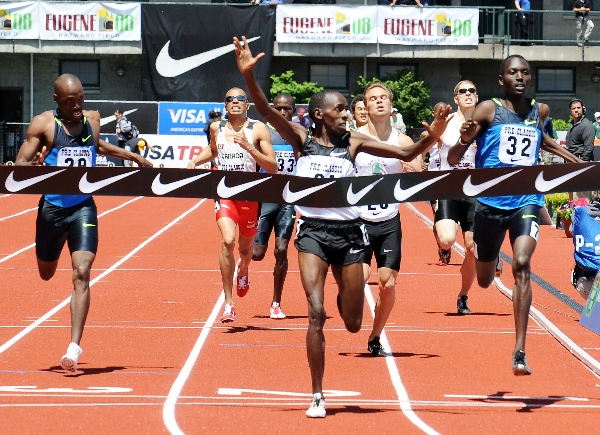
Robinson, left, finished third while Symmonds placed fourth at the 2008 Prefontaine Classic. (Randy Miyazaki / TrackandFieldPhoto.com)
Literally, after the race I went to the back where we warm up and cool down and I did a workout. It was just ridiculous. And then I got back to Santa Monica, the next day, literally the next day, I trained stupid hard. Two or three days later, I couldn’t even run a 400 in 52. I killed myself, you know? And so what happened was, when I did that, I panicked. In my mindset, I need to come through the 400 in 49/50, and here I am I’m doing a 400m and I can’t do it in 52. I took a couple days easy and I tried to do another 400 and I felt like I was all out and I was 50 — point, 51.
What ended up happening was, I had overtrained. It was just the two workouts after the race that did it.
While Robinson was dealing with overtraining, Symmonds and Smith faced their own complications. Six weeks before the Trials, Symmonds was spiked in a 1500 in California. The cut to his knee required 10 stitches. Smith, meanwhile, still didn’t have a qualifying time for the Olympic Trials (1:46.50), a byproduct of the burst appendix that scrapped his 2007 season.
Smith: One thing I’ll take from Nick — I went to Penn Relays (in late April), and he and I both were there. There were only a couple of us from OTC there, and I ran absolutely terrible.
It was probably one of the worst races of my career. And we were running the next day, and he was talking about when we’re both going to make the team. And I’m sure he didn’t think I was actually going to make the team, but he was just a genuine — let’s be confident, have high expectations. I specifically remember him saying that, he probably doesn’t. That’s what I appreciate about him — he’s just a good teammate along with obviously a great runner.
Symmonds: He had been dealing with a lot of health issues I think he had a burst appendix. I kind of had written him off. I said to myself he was lucky to be at the Trials. I think he was number 32 to get in out of 32.
Smith: Most people get their qualifying time in the fast races in the summer from the year before. So going into it I won a lot of races in 1:47…..I didn’t get into any good races.
Gagliano: Going into the 800 meters, we have about two weeks to go, and he’s sitting in 33rd seed and they take 32 athletes.
Smith: The last weekend to qualify I raced in Eugene and I ran that in like 1:47.4 and then I drove up to Salem (the next day) and I had an OTC guy come up and pace me through about 400 meters and I ran an 800 in a meet by myself and I ran 1:47.4 again…
Lananna: He was one outside what got in. I remember working with Gags to put together the petition and then all of a sudden I think it was Alan Webb that scratched which then put Christian in the race.
Gagliano: And he (Christian) asked me if I would call Alan Webb’s coach, who I knew from Virginia, and if Alan was going to run the 800 meters. Coach called me back and was nice enough to say we’re going to scratch Alan, so all of a sudden Christian moved into the 32nd slot.
Smith: I went to Oregon to run the Trials, so it would have been — not just devastating, but embarrassing to be there for the Olympic Trials and not qualify. It was definitely pretty heavy on my mind.
Lananna: I remember saying to Christian, “Hey, now you’ve got the opportunity, take advantage of it.”
Editor’s note: USA Track and Field lists the field size that year at 30, not 32 with Christian Smith 29th on the entry list at the start of the meet.
The preliminary rounds of the men’s 800m were on the first night of the meet in 2008. They featured three heats of 10 runners. The top four finishers in each heat advance to the semifinals, as well as the runners with next four fastest times.
 Harris: I’m like late 20s at this point in my life I know who I am and where I am, as opposed to, say, ‘04 Olympic Trials in Sacramento.
Harris: I’m like late 20s at this point in my life I know who I am and where I am, as opposed to, say, ‘04 Olympic Trials in Sacramento.
(In 2004) I took it out like a bat out of hell — I’m a young guy, I got hair on my head, had too much energy and didn’t know how to control it. Went out in 50 point and they and got me.
After a while, you learn how to run through the rounds. You let the young guys take it out, you stay behind, you kinda watch, you just finish up: you make it through the rounds.
Robinson: The first round I barely made it through. I think I got sixth in the first round. And I was the first heat, think about that. In all actuality, I shouldn’t have made it through because they should have, in those other heats, run so fast that I couldn’t get through, but they didn’t.
In the first round, I sat, cause I knew my legs were so dead, but I thought I could kick and I couldn’t. I just didn’t have it in my legs so after that I was panicking.
Christian Smith and Andrew Wheating in the 1st Round of the 2008 Olympic Trials.
All of the expected favorites advanced to the next day’s semifinal. The two heats of eight included four finalists from the 2004 Olympic Trials: Harris, Robinson, Jonathan Johnson and David Krummenacker.
Robinson: For the second round, I said, “You know what? I’m going to lead and run,” and I led and I ran and I won. And it looked like I looked good and everyone was like “Oh, Khadevis Robinson is back,” but in actuality I felt terrible. I felt like if I had to take one more step I wouldn’t have made it.
Symmonds: I think everyone was a little nervous the way I ran the prelim. I like to play a little cat and mouse game in the prelims and not waste too much energy. I do recall the semis being a little more work than I intended to do, I think I ran a 1:45 something or other, sitting and kicking and coming up on the rail actually. I was fifth with 100 to go, but only found my way to the lead along the rail.
I remember thinking, I just ran 1:45 high jogging. I looked down at my legs and I thought, I have no idea what is potentially in these legs. I knew it was a 1:44 something. I don’t know if it was a 1:44 low or mid or high, and I didn’t know if it was going to be enough to make the team, but I kind of had built confidence up through the rounds, and I really felt that I would be on the team.
Wheating: The second round I was not light on my feet, I didn’t race the smartest and I just came storming down the homestretch and I know I didn’t win by much, but I won. And there is a photo of my head just thrown back. That was the race where I was like, holy crap — I can’t believe I managed to pull that off.
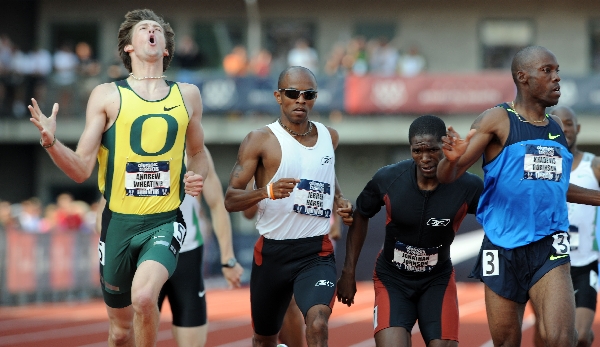
Wheating happy about advancing to the final with Harris, Johnson and Robinson. (Randy Miyazaki / TrackandFieldPhoto.com)
Robinson, Wheating, Johnson and Harris were the four qualifiers in the first semifinal. They were joined in the final by Symmonds, Solomon, Smith and Lopez Lomong. Robinson and Johnson had made the Olympic team in 2004.
Though he qualified for the Trials, Smith was still without the Olympic Games “A” standard of 1:46.00. He was the only one of the eight finalists who hadn’t broken the mark, meaning he’d need to finish in the top three and run under 1:46.00 in Monday’s final in order to make the Olympic team.
Smith: I didn’t even consider a possibility where I would be top three and not be under 1:46. Maybe in a different race where there’s not frontrunners, but we all knew what was going to happen, so I didn’t even consider it.
Symmonds: He found his momentum through the rounds and I was like, I can’t believe this guy made the finals, but obviously he’s not a serious contender for the Games because he doesn’t even have his “A” standard.
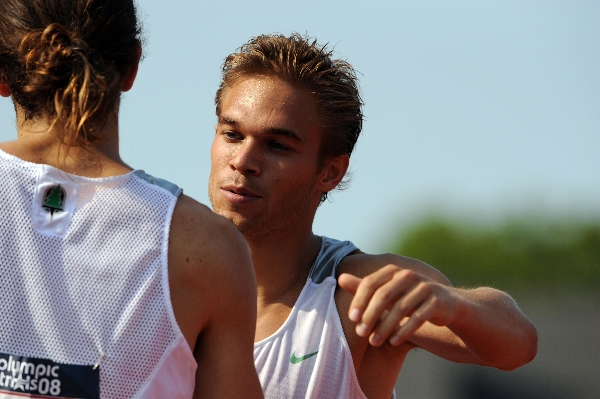
Symmonds and Smith embrace after the semifinal. (Randy Miyazaki / TrackandFieldPhoto.com)
Lananna: The thing was, during the prelims, I didn’t even notice him (Smith). I didn’t even know he made the next round. And the semifinals was the same, because I was paying attention to Andrew and a little bit to Nick and then all of a sudden we have three in the finals and Gags and I, we’re best buddies — but we didn’t talk about.…. Obviously when it got to that race, neither one of us talked to each other.
Anderson: I knew [Smith] was legit — I just hadn’t seen it. I don’t remember him running that much at Hayward Field that year. It just didn’t pop up on my radar.
Smith: What nobody really remembers is my senior year of college (2006) I had the second best time in the country. Khadevis ran 1:43 and I ran 1:44.8, and the next best guy was like 1:45-high. I was doing better workouts than I’d ever done so I knew that my PR was the third or fourth best in the field; I knew what I’d been doing in training. So it was a pretty small group that thought I had a chance.
Harris: The breakdown of the type of runners we had in that field were myself, Jonathan, Khadevis, Duane we’re somewhat frontrunners by trade.
And Lopez who at that point could run between the 1500 and 5K, I was like, why’s he in the 800? You can run any event he wants, why are you down here, dude? That just shows how much range and how talented Lomong is.
Lananna: We had some community dinner the night before [the final] with a few major University of Oregon track and field fans and I remember one in particular. It’s funny because a lot of people don’t realize that Phil Knight is a gigantic — not only is he a gigantic fan of track and field, he really understands the sport and has the ability to really project.
I remember talking to him, and said, “So you gonna be there tomorrow? And he says, it’s going to be a historic Hayward Field event that 800 — I wouldn’t miss it.” And, you know, he was right. And for me I was trying to downplay it. I always try to under-promise, over-deliver.

Wheating: Getting to the final, it was like, OK, I got to the final — I can’t do wrong here. Nobody expected me to get this far, let’s just see how things go.
Smith: I thought I needed the long drive and not out fast, but I needed to be toward the front with 100 to go.
Robinson: It started in the first round so when I went in the first round I said, “OK my legs are dead — I’m going to sit and kick.” When I tried to sit and kick and I got sixth I thought, OK, I can’t do that — I just don’t have that gear.
For the second round I said, “Let me lead,” and I led I came through 51 or 52 — I can’t remember what it was, and, even though I won I knew how I felt. So even in my mind I’m going, OK in the finals I can’t do that because there is going to be a better set of runners, so I’m going to need to lead a little bit quicker. So the reason I did what I did in the finals was that I wanted to make sure that everybody had to run a PR to beat me.
Smith: It was pretty obvious what was going to happen. Khadevis was going to take it out, he always did. Even if that didn’t happen, JJ (Jonathan Johnson) was going to do it, so I basically knew what was going to happen, and I also knew that I didn’t have a big window for mistakes. I couldn’t run in the outside of lane one or lane two — I just had to run an efficient race.
Symmonds: I wasn’t totally sure if I could outkick KD. He was the only guy that had beaten me in that last couple years, regularly. At least in my eyes, he was the favorite, but I thought on the right day, I could beat him like I had the year before at the Pre Classic.
I knew that everyone was going to be in 1:45 shape. I knew it would be KD, myself and everyone else fighting for that third position.
 Lomong: I watched a lot of video of 2007 (the US Championships where Lomong finished fifth), that 800 meters. Because Khadevis is a frontrunner of course….I was like, I gotta be there with 120 meters to go — I need to be there.
Lomong: I watched a lot of video of 2007 (the US Championships where Lomong finished fifth), that 800 meters. Because Khadevis is a frontrunner of course….I was like, I gotta be there with 120 meters to go — I need to be there.
Harris: If you are in the finals in the US in an Olympic Trials, you’re quality. People say Nick is sit and kick. I’m not about to gamble to say he’s going to sit and kick. I’m not going to gamble that Khadevis is going to take it out. I’m not going to gamble that Jonathan or anyone else is going to take it out. I just know, when the gun goes off, I need to be in the mix
Solomon: I actually didn’t really have a strategy. Leading up to the Trials we actually had our NCAA final and I took third place….And in that race I tried to lead the race, and it kinda didn’t work out that great for me. I got beat out by Wheating and Jacob Hernandez. So the whole time leading up to the Trials I was thinking about those two who already beat me and I’m thinking like, that’s two spots right there, and then I’m thinking about the pros that we have to race as well. So I’m thinking, like, I’m going to have to pull something out of the hat to make this team.
Symmonds: I knew it was more likely that I beat myself than that someone else would beat me and keep me off the team. And so I talked to Coach Kelly Sullivan (Symmonds’s college coach at Willamette University) about managing those nerves and he said something that really reassured me. He said, “Nick, the cream always rises to the top and you are part of the cream.”
Solomon: It was a little intimidating, because in college I was able to run from the front and be comfortable with it and then once I line up with these guys, I’m trying to change. I’m like oh I don’t know if I want to lead anymore, cause these are pros. These guys are way faster than me, so I’m not going to do that.

Gagliano: We gotta be there with 100 meters to go. You gotta be there because Khadevis has a wicked kick, but you gotta be there.
Anderson: I didn’t really have a clear feeling who would be third. But if I’m being honest, I didn’t think it would be Andrew, and that’s not a knock on him at all. I just thought he was too young and not quite ready, but I should have known better.
Wheating: I remember warming up that morning — we were doing strides, and I felt light as a feather and I remember Andy Powell the assistant coach, he said, “How do you feel?”
I said, “I think I can do it. I think I can win this race.”
He’s like, “I wouldn’t get ahead of yourself…”
“Nah, nah, something feels right — something feels right in my legs. I feel like this is going to be a good race.”
Lananna: Once he got to the finals, it was basically, “Hey Andrew, eight people in the race, anything can happen. Make sure you’re rolling with 80 meters to go.”
Wheating: I talked to Vin about what we should do and what the plan is and he’s like, “you know I don’t want to tell you to do anything. I think you’ve got great instincts. Trust your instincts Let’s just see what will happen.” But I’m sure, and I know now, Vin was calculating every possible way to run this race, because this is what he does.
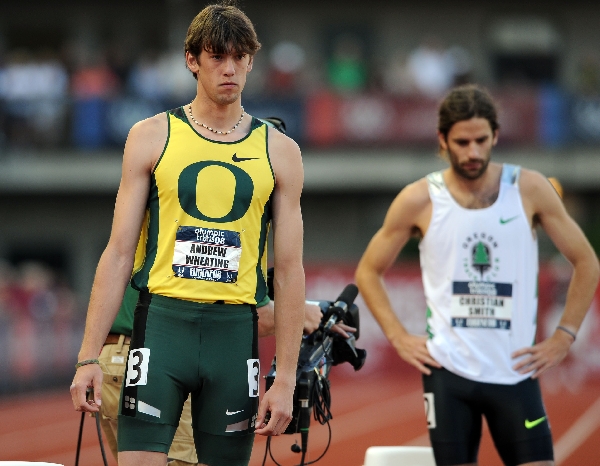
Wheating and Smith before the final. (Randy Miyazaki / TrackandFieldPhoto.com)
Lananna: I know he has a nose for the finish line. And [my advice] truthfully was to follow his instincts, because his instincts were always to get to the finish line first, and I think that he was new enough in the event that an overanalysis of it was not going to be a good way to go. So, even though I had analyzed it I certainly didn’t share any of that with him.
Symmonds: It’s cutthroat. It’s do or die. You have to perform on that day or you can go home and wait for four more years.
It’s the most nerve wracking ordeal or experience that I’ve ever been through.
Harris: The 400 you are protected by lanes — you are not interfering with anyone. The 1500 — I mean I’ve ran it before: you have more room to make a mistake and gather yourself, even against a competitive field to a point. 800, you fuck up against a quality field and that shit is over.
Wheating: I’ve always found the 800m is about trying to run with as much energy conservation as you can. That’s why I stay outside of all the riffraff, cause I don’t want to stumble. I don’t want to trip, cause that is all energy loss. You don’t have time to make a mistake. You have literally time to make one move, and that’s why you have to do it with confidence, because if you second-guess yourself in the middle of that move, come off the throttle, people are going to take advantage of it.
Symmonds: There are two categories of athletes: those who have made an Olympic team and those who haven’t and I don’t believe that title necessarily dictates how talented one is or, you know, defines success in our sport, but when it comes to earning potential or the regard of the general public you gotta make that team.
Robinson: You’re going to get more bonuses from your sponsors. You are gonna get the money that they give for winning the USA Championships or Olympic Trials. You are going to get bigger appearance fees when you go to races. You are probably going to get a better contract extension.
Symmonds: Right after the final warmup, I went and gave him (Gagliano) a big hug, and he just grabbed me and said you’re ready. Coming from a guy like Frank Gagliano, who had coached a dozen Olympians already that’s all he needed to say. If Gags says you’re ready, then you’re ready.

Wheating: I didn’t really think so much about the races. It was just — I want my face to be on a gigantic Jumbotron. Being in that stadium, I just think that’s the coolest thing in the world. Seeing the football players get these moments where the crowd is screaming and cheering — I just wanted to be on the Jumbotron, that’d be great. And they announce my name, the crowd gets so loud I’m like, oh my gosh these people know who I am! I love this place.
Lananna: When they were announcing the lanes, and here you got a guy I was focusing on: Andrew Wheating, thinking, I wonder if he’ll be able to withstand the kind of support and pressure that he would have as a guy running in a Duck uniform at the Olympic Trials.
They announced: the young sophomore….as the announcer was announcing it, the crowd was getting louder and louder before they even announced his name, and I was looking at the video board because I was behind him. So I’m looking at the videoboard, see him with a smile — the little kid’s smile — but looking around, it’s like, yeah, this would be kind of cool was the look on his face. And I remember chuckling to myself — this guy is really sucking this all in.
Gagliano: Don’t forget, home-field advantage in Eugene is unbelievable. When that crowd gets behind you, that’s a different ballgame.
Symmonds: I said to myself, “How lucky am I?” I just go and do the same exact warmup that I’ve done every single day for the last two years. I know where the ice bath is, I know where the bathrooms are, and I know that when I come down the last homestretch that the 20,000 people in the stands want to see me win, or they want to see me make the team. Maybe they wanted to see Andrew win a little bit more, but I knew that the crowd was behind me, and I remember vividly the way that they brought me home in 2007 at the Prefontaine Classic.
Wheating: As I sat there on the block, I had this itch in the back of my head. I was like, I think I could probably win this race. I had no idea Khadevis Robinson was like a 1:44 guy. I knew Nick Symmonds — cause he’s local, he’s been around town and he’d just won the Pre Classic race. He was on the radar in a big way. Outside of those two guys I had no idea who I was running against.
I’ll stick to my strategy, I’ll run my race the way I run it. I had no idea who to expect to do well I just know how I could win. So, that’s what I stuck to.
 Tierney: It was starting to get dusky — beautiful, clear, warm night.
Tierney: It was starting to get dusky — beautiful, clear, warm night.
Lananna: From the moment when the announced the finalists and the gun went off, it just got louder and louder.
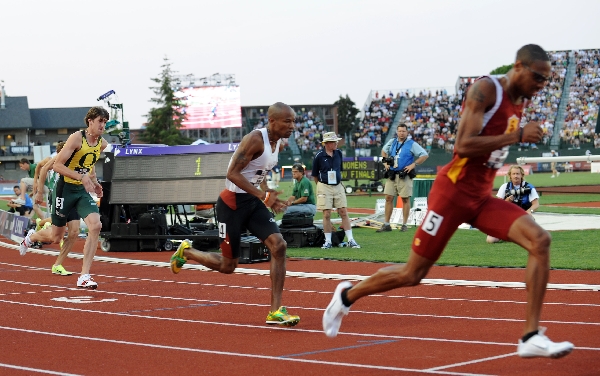
Wheating, Harris and Solomon after the gun goes off. (Randy Miyazaki / TrackandFieldPhoto.com)
Wheating: We take off and, in the first 50 meters, I can already tell I’m sliding straight to last place, and it’s fine — I’m not nervous. I’ve done this dozens of times the year, the year before. I always fall back to last place.
Robinson: I followed (in the first round) and that wasn’t good. I led (in the semis) and I made it. But I know that in the finals, that’s going to be tough, so what do I do?
So we just went with what we knew best. Here’s what we are going to do: we are going to make it a proper race and if the guys are going to beat you they are gonna have to run a personal best. And that’s what I did.
Wheating: We all cut in and I see immediately off to my shoulder on the inside…… Nick and I had been pretty good buddies that year, and he’d shown up at a couple of our parties and we’d kind of connected, like he’s a good friend. There was some kind of weird vibe there — I just wanted to turn to him and say, “Nick, let’s do this.” He gave off such confidence that I kind of soaked in. Being next to him I knew there was a good chance that we could do something great here.
Lananna: I kind of felt like the race was going to go out fast, and the way Andrew ran I never really worried about him going out too fast. Andrew was the type of guy that, if you said to him, “Andrew, run 26-flat for the 200 in a workout, he could run 26-flat and he could feel it and he had the incredible innate ability to be able to adjust midway through, even as short an interval as 200 meters. So I was quite confident that the race would go out plenty fast. And he’s a big guy so I felt that he would make sure that he wasn’t stuck on the rail — that was the only thing I was concerned with.
Solomon: When the race went off, the pace really did seem very fast. I was like, we are running way too fast right now. I don’t know how long I can keep up on this pace. But then, little by little the race started to calm down a little bit and the guys seemed mortal. They seemed like they could be beat.
Wheating: We get through 200 meters, no movement. We get 300, no movement. It’s fast. It feels fast. But I’m comfortable, I’m not straining.
Harris: It’s just like a little beehive. You’ve seen the cartoons….just buzzing all together….it’s just fast and congested.

Symmonds: When we hit the 200 meters and I saw 23.9 for KD I almost started laughing out loud. I mean, are you trying to run 1:36?
Robinson: When I was doing that, Jonathan Johnson, for some odd reason, tried to pass me going through the 400. And so what happened was in any other given situation, I would have held him off a better way or I would have just let him go and sat on him.
Smith: What ended up playing out was the dream scenario: I got relatively easy toward the back. Between 300 and 400 Duane Solomon, if you watch it, he moves out and he moves up, and that allows me to move right up behind the leaders. So without leaving lane one, and without having to go out really hard, I basically found myself in third place for the last 300. I knew that I couldn’t do any big moves and I knew I had to be efficient as possible I knew I had to run basically a perfect race.
Solomon: The first lap I’m not able to get a position….I don’t know where I want to be at in the race so I’m just kind of in the middle of the pack trying to get to the front, but I’m a little bit boxed in so I make an awkward move at I want to say the 400 or 450 mark…..where I jump backward and I jump to the side and then I try to go and I think that was a bad move on my part.
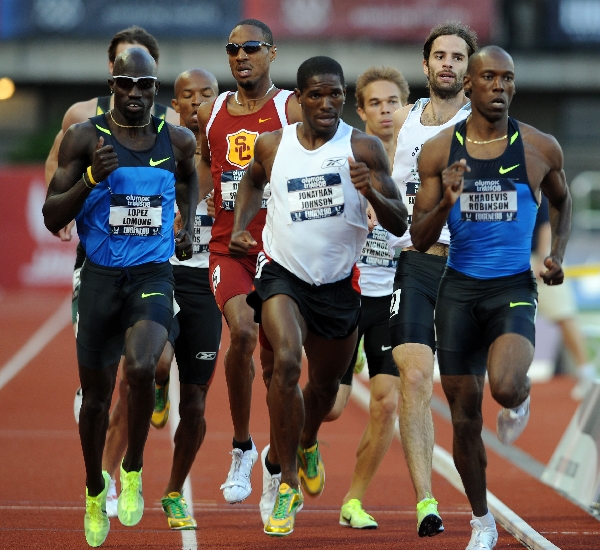
At 400m, it’s a tight pack with everyone in contention. (Randy Miyazaki / TrackandFieldPhoto.com)
Robinson led the field through the first lap in 50.3 seconds. Johnson was just behind him on the outside. Behind them, Smith was on the rail with Lomong to his right. Wheating trailed the field, just behind Symmonds.
Symmonds: I thought that at 50 seconds it would be much more strung out than it was.
I was shocked to hit the backstretch on the second lap and find that it was as bunched up as it was, and there was no way for me to get around it. I just had to be patient.
Solomon: I think it was the 550 mark I really tried to make a move and I felt myself almost kind of closing on a lot of people.
Wheating: You can see people are starting to jockey a little bit, and you can see I’m following along. I remember Coach saying, “150 to go — just remember 150 to go.” I’m seeing all this movement and I’m starting to get a little nervous cause I’m —I should start moving, I should start moving. But I trained myself that year to practice patience. Just because other people are starting to frantically move and freak out, doesn’t mean you need to move.
Harris: We all used each other’s energy to work down that backstretch in that front pack…No one got broke off on that backstretch — we all went.
With 200 meters remaining, Robinson still led with Lomong just behind and Johnson drifting farther back. Smith, who hadn’t moved from the rail, was alongside Solomon in third place. Symmonds was behind them with Harris and Wheating to his outside.
Robinson: When I went to about 600, I knew this is not going to be good. And so, I was just trying to hold on at that point.
Harris: Everybody was moving at the same time. That race, there were no frontrunners, there were no backrunners, I just felt like there was a blob of us just going at it.
Symmonds: At 200 to go, I said it myself, “If I can find a way to get around these guys I’m 100 percent certain that I’ll make the team.” Cause I could see them, and I could see them kind of slowing down and all I wanted to do was go faster. I just tried to say, be patient, be patient, something will open up, something will open up.
Anderson: I remember Nick and Andrew being pretty far [back] coming down the backstretch on the second lap and then Nick got boxed in….

Gagliano: What the hell is he doing on the rail, you know?
Symmonds: At 150, about six or eight inches of lane opened up and I knew it would take a little bit of bumping and I’d have to kind high-step some back kicks and I thought this is a risky move, this is asking to get tripped. But fortunately, it just worked out perfectly that I was able to shift from the outside of lane one to the inside of lane two. And once I had shouldered my way through, it was just like perfectly lined up.
Harris: Coming around the 200 Jonathan Johnson was slightly in front of me I was coming up on him. He ran a little wide off the rail and Nick came through and, you know, I would have done the same thing. He made his way kind of shoved Jonathan a little bit and that came into me.
Symmonds: I grew up playing hockey and they used to say, “Slow and steady pressure on a player will duress them,” and so you are always leaning into a guy when you are fighting for a puck. So I’m thinking to myself, if I just put a little bit of a shoulder into this guy, he’s going to move. And sure enough a little shoulder was enough.
Harris: Nick had his way going through middle and maneuvered his way up. He ran smart; he took advantage of the opening.
Smith: I knew Nick would be coming; I wasn’t really aware of when it was going to be coming.

Harris: You lose a step in a field that strong, the race is somewhat over with. It’s a good field and I got sandwiched — I shot back.
Wheating: Right before we hit 150, I see Nick Symmonds just go from the rail to the outside of the pack in like three steps just da-da-da, out, and takes off (snaps). Nick knows it; Nick’s got the right idea. He’s got the plan. He’s on my plan. I gotta get going or I’m going to get left behind.
Harris: That’s when Andrew came down from the outside, cause he was building as well. We were all building our kick at the same doggone time.
Wheating: We hit 150 and [Symmonds is) already second place, third place now so he’s moving.
Symmonds: I turned the jets on and pulled even with KD. And as soon as I pulled even with KD I was almost certain that I’d win in.
Robinson: I know when Nick went by, I’m running and I’m thinking, like, I have nothing.
Wheating: I’m too big to try and like weave in between people.
I’d rather just stay, work a little harder and have just this straight shot to the finish line. That’s a big part of my race coming around, just seeing the finish line and not stopping until I get across it.
Tierney: It’s when they hit the second-to-last turn, over by the steeplechase, that people just started freaking out. The crowd was going insane. Every single person in there was on their feet just like screaming. And down the homestretch was as loud a crowd in an outdoor event you’ll ever hear.
Lomong: It was so loud also because the Oregon guys were there and everybody was going nuts and I was like OK, this is where I need to be and I’m just going to concentrate on my lane and try to run as short as possible.
Gagliano: I knew with 150 meters to go, I knew he [Symmonds] had another gear, I mean a big gear because he was cruising. And when he came by the Bowerman statue he put on a move that was unbelievable.
Wheating: We come off the final turn and I’m swung as wide as I can go and [Symmonds] now….he’s taken the lead. And I’m in like seventh place and I’m like, I don’t know if I can catch him. There’s like 100 meters left and he’s got a 20-meter lead on me — this is unbelievable.
Symmonds: In the back of my mind, I thought Andrew still has a great kick and he could still outkick me. I knew for a fact with 90 meters to go that I was going to make the team.
Anderson: Andrew — I didn’t notice him until maybe 80 meters left to go and I just saw him just gobbling up the ground like no other 800m runner. My legs were shaking it was so loud. It was crazy.
Wheating: And so we’re starting to charge down the homestretch. I’m going from eighth to seventh to sixth to fifth.
With each person I pass — I didn’t really realize it until I got to maybe fifth — that the stadium had just erupted into this enormous roar, and the only way I could describe is being at an Autzen Stadium football game.
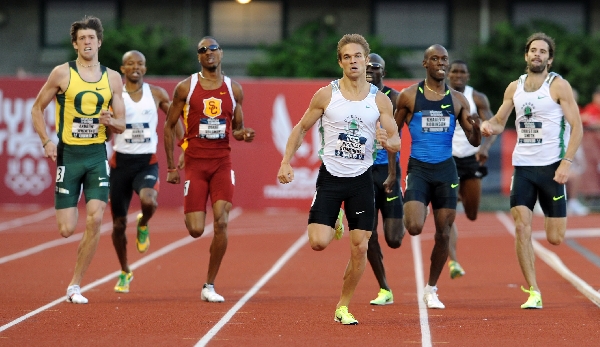
Spread out across the track coming down the final 100m. (Randy Miyazaki / TrackandFieldPhoto.com)
Wheating: Moving from fourth to third is where I really noticed it, cause those were the Olympic spots and I hit third place and I can’t even literally process thoughts. I can’t even hear anything it’s just this sound, this dull roar, this blanket sweep of noise and I squeak into second place and it’s — another decibel level goes up.
Solomon: Nick was already gone — he passed us a while ago. That was a spot that was already gone, and then OK, I’m in the game still, and then I remember looking in my peripherals and then seeing Wheating go by just really quick and I’m like, well he’s gone too.
Symmonds: It’s all kind of like a dream. It’s just deafening and you’re trying to stare at the finish line and focus on it. As I recall, I thought it was a lot closer. As I go back and watch the video I’m like, oh shit, I really put some distance on them. I remember thinking it was going to be this really tight sprint to the finish, a real drag race where everyone was going to have to out-lean each other, and I’d actual spent a month practicing my lean.
So if you watch the race I dip as hard as I can with my right shoulder at the finish line, and it was because I was so terrified that someone was going to outlean me, and I wasn’t dumb enough to look left and right and not focus on the finish line. So in my mind I’d been visualizing sprinting as hard as I could for that line and throwing my shoulder as far as I could and not think about anybody else, just think about executing the perfect race.
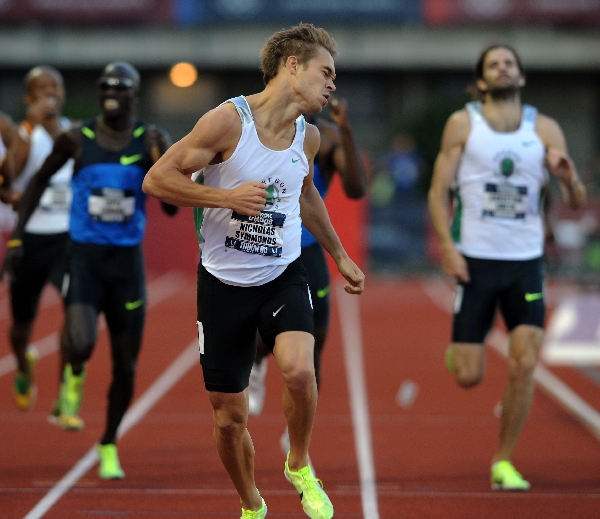
Ahead by a clear margin, Symmonds displays the lean that he’d practicing a month leading into the Trials. (Randy Miyazaki / TrackandFieldPhoto.com)
Wheating: From about 70 to go, to about 30 to go. That 40 meters on the home stretch, there’s just a blur. I can’t even put into words what happened. I remember coming off the turn, trying to chase Nick, and then I hit the home stretch. I remember looking at the finish line and there’s like a blur where I can’t think of anything until I realize what’s about to happen.
Anderson: It was a crescendo without a doubt. People could see, Nick’s going to win this, that’s great. But Andrew was the engine that really drove that, because he’s the Duck. There’s probably more of a connection at that time with the University of Oregon than with OTC Elite, since they were so new.
Wheating: Up to that moment I thought, I’m going to lose, I’m going to be second, but then you see my jaw drop and my eyes open when I realize I’m going to the Olympics. That was it. That’s when I realized this is going to change my entire life.
And it’s like that sports movie where it’s like the final moments, the winning moments, slows way down, the heartbeat comes in and it slows down and then speeds up as you cross the finish line and the noise gets right back into your face and you actually hear what’s happening.
Solomon: We’re battling for third and it was just a wall of us and I tried to get another gear and I didn’t have anything left, I was just trying to muster anything I could. I didn’t have anything — I felt like I was going backwards.
Robinson: I’m trying to hold on and just finish and get a top three spot.
Smith: It was a weird feeling with 50 — you could feel the magnitude of the race at that point because it was so close I was tying up.
In an 800-meter, you are tying up anyway so you add all of that on there and I remember just really, in the last 20-30 when I’m slowly evening up with them, it was just almost like wondering if you are going to get there or not.
Robinson: Cause Christian passed me on the inside, right? And Lopez was on my outside. In actuality, I was fighting off both of them even though it appeared I was fighting Christian off and diving, which I was…I could feel Lopez and I touch each other. I just knew, whoever else was next was going to be third.
Smith: Generally people will try to fight off someone on the outside and since Lopez was on his [Robinson’s] shoulder, people are going to drift out. I always drift out. It’s not like I necessarily waited for him to drift out to move up.
I never left lane one so I ran shorter than everyone else
Lomong: I was way in lane three and fighting with Khadevis, like tumbling — he was grabbing my jersey.
Robinson: I do not know how I made the last 30 meters. My legs were gone, like nothing. I have no clue how I made the last 30 meters. I just don’t know.
Smith: I was leaning to where I knew I wasn’t staying on my feet. I knew I was going down so it was more of a lunge. It wasn’t like I thought five meters out I gotta dive. It was, I’m almost there…..I’m leaning…..I’m leaning and then just lunging basically.
Lomong: I saw this guy. I was like oh shit, you know — he dove from nowhere.
Gagliano: He [leaned] so much that he just fell over.
Lomong: Khadevis, you know, kind of hold my jersey, and I was fighting him going all the way to the finish line.
Smith: You see a picture with [Robinson] having his hand out on both me and Lopez, but I don’t really remember any contact. If you watch the video Lopez is upset about it, which I totally understand. Honestly, I don’t really remember any contact.
Smith and Robinson dive for the final Olympic berth
Robinson: He was upset because of the contact and cause he felt I held him back, which is understandable. I probably would have been upset also…
It ain’t like you see somebody and grab them and go, “OK I’m not going to let them pass.” It’s a response — you’re just running. You are just trying to keep somebody from passing. You don’t have enough time to think at that point, you know? You don’t have time to think — I’m going to do this…don’t do this…You are just running, trying to get to the line and there is somebody beside you.
Harris: I did not see the dive, I was going straight. I just know to keep running, to run through the line. Hell, if they all fall 30 meters before the line, I’m still chugging along. I may have to jump over them, but you run to the end no matter what cause you never know what can happen.
Solomon: I was trying to be Usain Bolt and I was trying to gun it to the line and when I did that I used up everything. I wouldn’t have had anything left. That was everything I had right there, I didn’t run it correctly and I paid for it.
Smith: When I was lying on the ground I thought I was third, but I really didn’t know so I was just like, oh, my god, I might have made the Olympics. Then I saw it when it popped. It was pretty nuts.
I think I was still on my knees when I saw I made the team.
Anderson: I don’t think anybody knew at that moment who got third until the results flashed on the videoboard, but I sensed it.
I thought, oh god, Christian may just have made the team. It was so close I wasn’t positive, but then his name flashed up on the video board and chaos reigned.
The results on the board read:
1 Nicholas Symmonds OTC/Nike 1:44.10
2 Andrew Wheating Oregon 1:45.03
3 Christian Smith OTC/Nike 1:45.47
4 Khadevis Robinson Nike 1:45.53
5 Lopez Lomong Nike 1:45.58
6 Duane Solomon U S C 1:45.78
7 Jebreh Harris Reebok 1:46.21
8 Jonathan Johnson Reebok 1:48.11
It was a personal best for Symmonds and Wheating. Just over a tenth of a second separated Smith, Robinson and Lomong for the final Olympic spot.
Wheating: There was some weird catch phrase that was going around and it was like “oh my man; oh my man.” I don’t know, it was some college thing. So I walked over there, ”Nick, oh my man; oh my man.” He was like, great job. He said, “You make it?” I said, “Yeah I’m on the team — I made it.
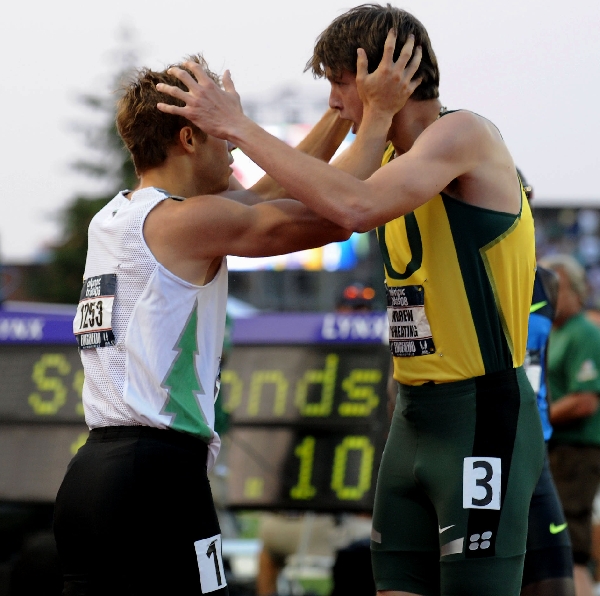
Symmonds and Wheating celebrate. (Randy Miyazaki / TrackandFieldPhoto.com)
Symmonds: I turned around and saw Wheating and I knew that he had made it and then we kind of hugged and waved to the crowd and then I realized we need to figure out who else is going to Beijing with us, and I could see the carnage on the track behind me of guys collapsing and KD and Christian lying on the track and I looked at the scoreboard to see what I could learn.
And as soon as I saw Christian’s name, I smiled, and then as soon as I saw the time next to it and knew that he had gotten his A standard, I was shocked, and I just ran over to pick him up off the track and give him a hug.
Smith: That’s one my favorite parts of watching it is his reaction to seeing me be the third guy. It’s like he’s celebrating, he saw Wheating celebrating and then he’s just, “Oh, who’s third?” And then he saw it. That’s one of my favorite parts, him seeing it.
The whole time you believe you can do it, but to actually do it is almost disbelief so it was a lot of me putting my hand on my head like, oh my gosh, it actually happened. It was almost not really believing it.
Wheating: I didn’t really understand the relevance of it until I turned around and Nick was running over to pick him up and I put it all together…..Oregon…..Oregon……Oregon. This crowd’s got to be loving this.

Lananna: I wasn’t so much in disbelief that Andrew made the team, I was more in disbelief that it went 1-2-3. I saw Nick, I saw Andrew — you couldn’t quite tell first/second. Then, when they flashed the results on the board within, it seemed like an eternity, but it was probably like 10 seconds — I remember my heart beating and Gags was coming one way, I was going the other way and we embraced at the, somewhere in the middle — 10 meters into the hundred.
Solomon: Part of me was like, good for them. But at the same time I just wanted to get off the track, I didn’t want to be there.
Harris: I just knew that the crowd was cheering, they wasn’t cheering for me. So I just stood there, looked around, looked at the moment. I’m like, you know, it’s not my stage. Time for me to get off the stage right now. It wasn’t my moment to bask in someone else’s top three finish. So you know I respectfully walked off the track.
Tierney: All these normally grizzled journalists who normally cover track meets, who think they are so cool because they know everything about track were like jumping around and freaking out in the media work area because it was so — the crowd was going absolutely bananas. It was one of those sports moments where you’re like you can’t even explain what it was like to be there and explain just the energy and buzz you feel when something magical happens. And the hometown kid wins. And the other hometown kid comes in second and they both are going to the Olympics. And the third place was this ridiculous finish.
 Terzenbach We are all up there trying to be volunteer professionals and keep our cool, but the fact is, we wouldn’t be volunteers and we wouldn’t be there if we were not passionate track fans. So I think there was a little bit of it where we were so excited, but we had to keep it calm because we had live mics up there and somebody announcing and you didn’t want to have me as a 21-year-old screaming like a little girl about what was going on. It was almost like holding in a sneeze up there in the press box, which is funny because everywhere else it wouldn’t have mattered what came over the microphone — no one would have heard it, it was so deafening.
Terzenbach We are all up there trying to be volunteer professionals and keep our cool, but the fact is, we wouldn’t be volunteers and we wouldn’t be there if we were not passionate track fans. So I think there was a little bit of it where we were so excited, but we had to keep it calm because we had live mics up there and somebody announcing and you didn’t want to have me as a 21-year-old screaming like a little girl about what was going on. It was almost like holding in a sneeze up there in the press box, which is funny because everywhere else it wouldn’t have mattered what came over the microphone — no one would have heard it, it was so deafening.
 Sinkbeil: I don’t know how long it lasted, but I swear I couldn’t talk to anybody next to me. I’ve never been any place in track that was that loud. I’ve been to a lot of different places. It may have been loud for five seconds, 10 seconds — I have no idea, but all I know is during the finish of the race and for I don’t even know how long afterwards, like I said it could have been 5 seconds or 30 seconds but there was a point in time where you couldn’t hear. I couldn’t have spoke to someone next to me if I wanted to. It was deafening.
Sinkbeil: I don’t know how long it lasted, but I swear I couldn’t talk to anybody next to me. I’ve never been any place in track that was that loud. I’ve been to a lot of different places. It may have been loud for five seconds, 10 seconds — I have no idea, but all I know is during the finish of the race and for I don’t even know how long afterwards, like I said it could have been 5 seconds or 30 seconds but there was a point in time where you couldn’t hear. I couldn’t have spoke to someone next to me if I wanted to. It was deafening.
Smith: It’s pretty cool when you listen to it afterwards there are three distinct eruptions — there’s an eruption when Nick goes and then there is another eruption when Wheating goes and then there is a third one at the finish when I get third so you definitely felt that the pride of the jersey in that stadium. That’s what was really special about experiencing it there in Eugene and having lived there all year……Having that experience in that city, in that stadium, wearing that jersey made it totally different for me.
Symmonds: That’s the loudest I’ve ever heard Hayward Field period.
 Pappas: That was definitely the loudest I’ve ever heard in the U.S. for sure. Maybe when you get to 100,000 (seat stadiums) like the Sydney Games when (Cathy) Freeman ran.
Pappas: That was definitely the loudest I’ve ever heard in the U.S. for sure. Maybe when you get to 100,000 (seat stadiums) like the Sydney Games when (Cathy) Freeman ran.
Anderson: I think Ashton Eaton might have eclipsed it four years later with the (decathlon) world record. They were both incredibly loud. Those were the top two. Ashton Eaton setting the world record, running the 1500 the way he did with all these past Olympic gold medalists in the decathlon at the finish there was just some poetry there that I really appreciated.
Wheating: Ashton’s world record 1500m — that was close. That got pretty loud.
Sinkbeil: That was kind of different because it was more of a longer term deal and I guess it was different because you knew he was going to win the decathlon so you’re just watching the clock to see if he would get a certain time.
To me that wasn’t the same. Maybe I’m just partial. It was close, but it wasn’t quite the same.
Anderson: Because the 2008 race came first, maybe it had more of an effect on me. Somebody wrote that people were having dinner at a restaurant two, three blocks away, and the crowd erupted with such force that the building actually shook. That’s probably urban myth, but who knows? It was that kind of moment. That kind of race.
Gagliano: The way he dove to the tape and so forth….. I’ve been doing this 55 years and it probably has to be the number 1 or number 2 race I’ve ever seen.
Smith: It was deafening and the 1500m (of the) decathlon was the next event.
Pappas: I remember that we were delayed because I remember being stuck out there forever. I don’t remember if it was victory lap or just all the celebrating
Smith: It was unbelievably intense, not the type of intensity you get at an Olympic Trials. It felt like football intense.
Pappas: Man, they just witnessed that race and that finish and now they are going to see some big guys crawling around the track for four laps.
Anderson: I felt bad for Khadevis. He’s such a stand up guy and had been great champion for years and years, and I know how hard he works. It’s the same with any fourth-place finisher. In that particular race, it had to sting a bit.
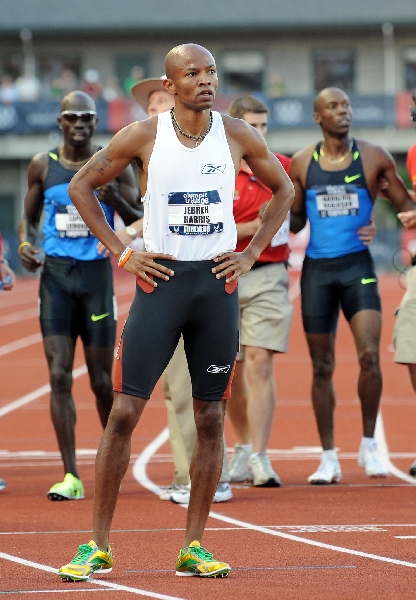
Harris reacts, Robinson helped off. (Randy Miyazaki / TrackandFieldPhoto.com)
Smith: The whole time you believe you can do it, but to actually do it, is almost disbelief so it was a lot of me putting my hand of my head like oh my gosh it actually happened.
Anderson: It was so fun — I wrote a 25 inch story about one race. Typically you don’t get to do that. As a track writer, you have to weave this narrative with all kinds of different events that aren’t related, which can be difficult to do at times. This was documenting a single moment and just one of the greatest races that Hayward Field has ever seen.
Wheating: I did everything wrong on a victory lap that you should have done. I now know the three main rules of doing victory laps, especially if your family is there.
First rule, find your family, find mom; second rule, find your coach; third rule, find your friends.
I crossed the line, my parents, my family were all right there, like literally right on the first turn right where the block was sitting, and they said they were screaming. They were yelling, they were all waving hands trying to get my attention. They said my eyes just glazed right over them. They said they did everything possible to get my attention, and I just waved at the turned and walked in the other direction. I didn’t know what to do. I wasn’t paying attention to any one. I was soaking in this whole aura of excitement. I was just kind of like, hey this is unbelievable, thanks for coming out, and I turned around and walked away.
Symmonds, Smith and Wheating during their victory lap
Symmonds: [I] saw my mom running down the stairs crying, so I hopped the fence to climb up on the rail and give her a hug.
Wheating: Then we got back around to the break line and finally my family had found me. They had gone from the start all the way around to like the break line there, and security was like no, no, no….My sister dove over and grabbed me, and they were like on the bleachers. So she was about I don’t know five and half feet off the ground and she was like diving over, grabbed me and gave me a hug.
And my parents were holding her legs trying to pull her back up and over. And Vin was there and he was holding me, doing the classic Vin Lananna side hug. It was kind of like this euphoric moment of all this excitement.
Robinson: We dove, I fell and I walked to the back, did a couple interviews and I saw my coach first, and he was like “That was so close, you’ll go to Europe and run fast and all those things.” Then I saw my wife and she pretty much had tears in her eyes and all types of things. Then, I saw my son and he wasn’t nothing but seven or eight months at the time so I saw him and he said, “Dada,” cause he didn’t know what was going on. He was just there and knew I had disappeared for a little while and I was there now and he wanted me to grab him.
Harris: I gave what I had that particular day. Went over to the practice field, saw my coach, like I said, shed my tear and just own up to what happened. That was just me as a mature athlete. That particular day was a quality field. We all wanted it pretty hard and the crowd showed it.
Lomong: I was talking to coach, ”Oh Khadevis completely grabbed your jersey.” But Khadevis was like fourth, you know. And Christian already made the team, so there is no need to go fight this, pay $100. I like Khadevis and we all fought and I was fifth.
We went to the medical tent — he was there with his family and of course he was disappointed as well. He didn’t make the team as well.
So, I talked to him, I gave him a hug. I was like, It’s all good, you know. He’s like, yeah I know. We just left it out there on the track.
Solomon: I remember, I was talking to KD and he was like, “Man, that’s crazy, all three Oregon guys made it.”
Robinson: I have a life philosophy, a personal life philosophy and that is don’t make any major decisions right after something goes extremely bad or something goes extremely well.
Retirement didn’t really come up then because I’m very competitive and I knew that I was in good shape and I knew I had what it takes to do well. So I knew I didn’t want to finish that way.
Lomong: It was amazing — he was very professional on how he handled it as well, and…because I knew that I had one more chance, you know, the 1500. He didn’t have it.
He was already planning: four more years.
Symmonds: It’s always a bit of a circus right afterwards there, it’s team processing and drug testing. You’re being pulled a hundred different ways. They want you to go and talk to the fans, but you also want to see your family. Literally, human beings are pulling you five different ways at the same time.
Robinson: If you are fourth, you still do all the paperwork and everything, because somebody could pull out or get hurt or whatever. I was — I’m not going to say praying — I was hoping….and this sounds crazy, but it’s the reality: I was hoping nothing happened to anybody because I wouldn’t have been able to run. I was overtrained. I was finished. I would have gone and just been terrible.

Wheating: First thing I had to go to drug testing. Can you imagine trying to pee with that kind of excitement? There’s no way, I was so hyped. And so I sat there for about two hours. Nothing happened. I was like, I can’t do this.
Eventually someone came in and they were like — guys look they are about to close down the festival [adjacent to the stadium]. There are like thousands of people out there waiting to see the 800 team come up, and we need him to come out right now. So they were like, OK, all right. So they assigned me like a chaperone.
I walked to the stage. As I walked to the stage and as I got up on the stage, there was Nick there was Christian. We get up there and, all of sudden, I look out and there was, I’d been sitting in drug testing for two hours, and here are thousands of people out here waiting to see us. I don’t remember how that went down. I remember sitting up there, standing on the stage asking questions and just everyone was screaming and yelling I couldn’t really get any words out.
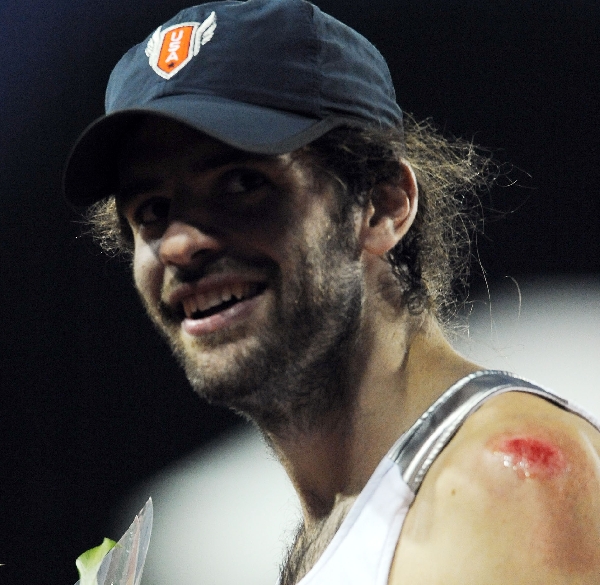
Smith’s battle wounds (Randy Miyazaki / TrackandFieldPhoto.com)
Smith: The three of us got up there, and everybody was out partying and they just started chanting U-S-A.
Wheating: I was going through [the crowd], everyone was taking pictures. This was before selfie was a huge thing so people were holding cameras trying to turn them around and get the right photo.
We ended up going straight to Track Town Pizza. There’s a picture in there of Nick and I cause he did the same thing. He went to Track Town. I wandered in there and there he was. There’s a picture of the two of us in there, the headline newspaper or something like that was in there, and we said the first place we went was Track Town Pizza and we both signed it.
Symmonds: I remember meeting up with my family and we got dinner over at Track Town Pizza and then we bar hopped a little bit and it was great because I was able to celebrate with my family and my friends. We shut the bars down and went over to my house and invited everybody we knew over there and probably had 50 people over at my house and partied until 4 or 5 in the morning.
Wheating: By the time I got in my hotel room. I just kind of got in and shut the door to kind of like decompress. And then those real deep thoughts start to creep into your head. I’m going to the Olympic Games: the biggest stage in track and field history. I’m going to be on an international level – my first meet in the international level is going to be in the Olympic Games.
All of a sudden the worry feelings start to come in. My life is gonna change, am I going to be the same person? Is fame going to change me? Am I going to perform well? Am I going to let down my country? You are just thinking these stupid thoughts as you’re in the heat of the moment. Eventually you just kind of settle and fell asleep.
Smith: I actually didn’t do anything. I basically couldn’t sleep. I stayed up, and my parents stayed up cause they were flying out the next morning and we just basically looked back…The whole year before had been really trying, and I had such a good senior year of college. I’d won a national championship, set a collegiate record, and the following year I didn’t run.
Lananna: The next two days were rest days. That was the talk of everywhere — the 800, the 800, the 800. It was played on the local television so many times: morning, noon and night.

Smith: It was pretty awesome. It was the one time in life –six days of my life– that I was actually famous. You would get noticed. People would ask for autographs if you went out into the main area, which famous athletes and people do all the time. But for a track person, especially one who doesn’t have much notoriety, it was a pretty fun experience to be able to do that.
Lananna: It was big. I remember sitting in my house shaking my head the whole time. We still had to put the rest of the meet on.
Wheating: This is the highest level of Beyonce I’ve felt, like I couldn’t walk 100 feet without being grabbed and asked for photos and signing something.
Lomong: I felt disappointed, you know. I put everything out there and it made me focus again and have that fire to come back in the 1500 meters and it all paid off.
Solomon: I got to a point where I was almost depressed. I was kinda thinking about just being done, cause I didn’t have a contract after college right away and I was just thinking like, man this is really too intense for me — I don’t know if I want to do this anymore. I gave it a couple days, couple weeks, just decided I’ll give it another try.
Symmonds: If I take one thing away from the Trials — and obviously it was great for me — but what Christian did, you know it’s a longshot. If the idiots that run track and field would allow us to bet on it or if the country would pass laws to allow us to bet on it, you put $10 on Christian Smith before the Trials start and that thing pays off 1,000-to-1, maybe 10,000-to-1.
Gagliano: Of course the newspaper people in Eugene, they’ve got a hold of me, “Hey we need to know about this guy and so forth, did you ever expect Christian Smith to make the Olympic team?” And I said no way. No way. He was the last one in, you know. But I think Christian got a little pissed off at me. I don’t think he talked to me for about a month or two.
Smith: I wasn’t very happy with the comment (laughs). That was, ultimately, part of the reason I wanted my college coach to do everything is because he was there for when I was really good in ‘06 and he knew what I could do. I mean, when he made the comment, it’s more like he was playing up the upset part of it. Gags saw that I had done really good workouts and that’s what we talked about later. It was more….I don’t think it was him saying I got lucky. What I was upset about was that I took it as you make it look like I got lucky, and that’s not really how he meant it. It’s more him talking about being an underdog and making it happen, playing up that side of it.
I wasn’t too happy about it, but you know I have nothing but great memories and feelings towards him.
At the Olympics, Symmonds advanced to the semifinals. Wheating and Smith both were eliminated in the first round. They were joined in Beijing by Lopez Lomong, who six days after finishing .11 behind Smith, took the third and final spot on the men’s 1500 team. Lomong carried the American flag in the opening ceremonies for the US.
Gagliano: Once an Olympian always an Olympian. You make the Olympic team they don’t have any asterisks next to your name ever in your life. It’s — you’re an Olympian. It’s a thrill to see a young man or a young woman make the Olympic team. It’s very sad to see someone finish fourth and get nailed at the tape.
Robinson: In 2008, if I had made the team that would have been it. At that point I was married and I already had a son. I would have transitioned to my other goals in life.
Solomon: I think that race was a blessing. It’s what I needed. I believe it was my destiny to not make that team — just for the fact that, if I would have made that team, I think I would have got a little complacent and just got comfortable with where I was at, and you probably would have seen a decline early of my career.

Robinson: No matter how I did at the Games, that would have just been it. But really, not making the team extended my career four more years.
Harris: I didn’t even watch the Olympics that year. I just couldn’t.
Honestly, it may sound messed up, but I forget who went. I really do forget who went to the Olympics in the 800 that year. That’s how much I didn’t really pay attention to it after the fact.
Robinson: I realized that through losing that race in the fashion that I did more people reached out to me — they felt like I was more human. They felt empathy and sympathy for me. They felt like they could come to me and say, “Khadevis or KD, you know I felt for you,” — all those things I wouldn’t have heard if I would have won.
Harris: I didn’t know that was my last trials. I didn’t know my last race was my last race in the Netherlands in ‘08.
After a while, after you’re working two or three jobs, volunteer coaching, ramen noodles and hot dogs, you become one of the top in the US. You’re not getting paid your worth, you have student loans, you have IRS looking at you, auditing you, trucks getting repo’d. After awhile, you have to think about your future — retirement, health insurance which I didn’t have. And I say this respectfully, but I really don’t think I got paid my worth.
I’m only getting paid $12,000, that’s not gonna get the job done.
Solomon: There was no doubt in my mind. I thought if I make the team [in 2008], there is no way that I can’t get a contract. That’s just how it was. And I even thought after the race that I would get a little something. I didn’t know, but I figured I’d get something. There’s no bites, there’s nothing. So that was hard.
Wheating: I didn’t know pro offers were a thing. I didn’t know being paid to run was a thing. Someone had mentioned, Wheating, you could get a triple digit figure, this and that…For what? What does that mean?
I remember sitting down with Vin and talking this through with him.
Lananna: Here you are a sophomore, just getting on the team. Any talk I thought of going professional I just thought was absurd. What I tried to do was just keep it in perspective. You got this great thing ahead of you. Why would you leave early?
Wheating: Somebody theorized about $300K. I thought that was insane and huge. Oh my god. I remember getting 15 bucks an hour doing some dumb shit job, so now you are talking about $300K for running in circles? Wow.
Lananna: A 1:45 on the Olympic level is no big deal. I just didn’t think that made any sense. I didn’t hear—all the professional stuff was not anything I heard of. It was stuff floating around out there from various people….I think it was one or two that were floating the rumor. I don’t know how serious it was.
Wheating: I wanted to finish school. I want to stay with my friends. I want to finish classes. I want to get my degree because if I get my job and paychecks before I get my degree, my focus is just going to disappear. So I had to finish school first.
Lananna: Going into every race it was, “Andrew Wheating, US Olympian.” Everyone was introduced as the “Pac-10 champion,” “number three in the country.” And it got to Andrew Wheating: ”Olympic athlete, junior, Andrew Wheating.”
It was a different introduction. I think that’s difficult for someone new to be able to hear, almost being subjected to your own popularity. I’m sure it was very difficult.

Wheating: I came back that year in 2009. We were doing some workout and I broke down. I remember I was sitting there crying with Vin. I was like, I can’t do this with all this pressure on me, everyone expecting me to be this winning Olympian every single year I compete now.
Lananna: He’s so easygoing to be honest with you and enjoys competition so much that there were small impacts, but I don’t think it was devastating for him.
Wheating: And he told me, no. Nobody is expecting anything of you. This is all really pressure you are putting on yourself. Vin was a very good support for me, transitioning from a kid racing to just an Olympic athlete.
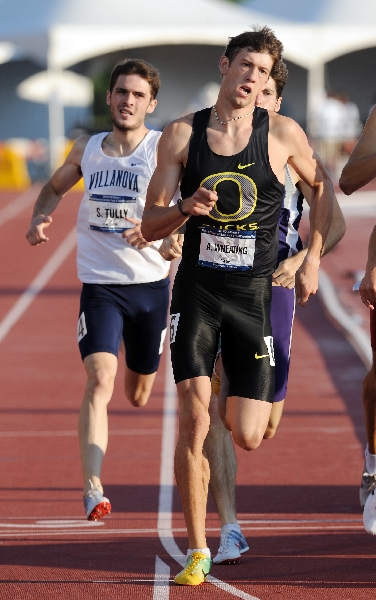
Wheating competing at the 2009 NCAA Championships. (Randy Miyazaki / TrackandFieldPhoto.com)
Robinson: I had to transform myself. After that race happened, they had that race everywhere, literally. Online, TV, you name it they had it on there. And that used to bother me because I didn’t want to hear about it. When I ran races and won, they never played those races over again, right?
Every time I go to a meet they just you know, they are replaying it on the big screen, the same race. On TV, I’m watching, I’m not even at the meet and they are playing the race. I go on the internet, I type my name in and that race comes up……

I’d be at a race and when the camera would be in front of me I know they would be talking about that race, and I wouldn’t want to look at the camera, cause I knew they were talking about that darn race that was two years ago. That’s how bad it got.
Solomon: I said, if I do not make London, I’m done with track. I have to make sure that the buildup from ‘08 to 2012 was going to be worth it, and I put all my eggs into London and….I’m just thankful for the experience of knowing how to lose and knowing how to be hungry.
Robinson: And then I realized something really quickly. I said hold on…..here’s what’s going to happen. I’m going to run back again: Olympic Trials 2012. It’s going to be in Eugene again. All those guys were young, so I’m going to have to race all those same guys in the same situation. I gotta face this. And so from that point on I embraced it, and I told myself, I said, “You’re going to go to the Trials, you are going to make the finals, and they are going to play that race and that’s going to be your cue that you’re going to make the team.” And so from that point on I trained my mind to welcome that race.
Smith: The following year in ‘09, I got fourth (at the US Championships) and really that was probably the most fit I’ve ever been in my life. I got third at Prefontaine against a great field, so I ran some of the best races leading up but I hurt my Achilles, just like two weeks out. I wasn’t sharp and I didn’t make the team and then, after that I just had an injury-ridden next three years until I was done.
In the years between 2008 and 2012 Olympics, Symmonds, Robinson, Lomong and Wheating all made championship teams. In 2010, Duane Solomon qualified for the World Indoor Championships and finally was signed to a sponsorship deal.
At the 2012 Olympic Trials, Symmonds, Solomon and Robinson finished 1-2-3 in the 800m. Wheating qualified in the 1500m and Lomong made the team in the 5000m. Smith, who relocated back to Kansas, retired after he was eliminated in the first round of the 800m.
Smith: I knew that was going to happen. I just went because I qualified. I did not have it on at all. I knew it was my last race.
I was basically going back over my career. From the time I was a senior from ‘07 to 2012 I was really only fit where I felt like I could run fast for a really short period of time. It’s a lot of heartache to train that hard for so long and not have it go better more often, but ultimately I was totally satisfied with the effort I put in the entire time. I was totally dedicated to it. There are a lot of great athletes that don’t have the moment I had so ultimately that’s—I got that when a lot of people don’t. So that makes it pretty easy to stomach the disappointments knowing that I have that.
Symmonds defends his title at the 2012 Olympic Trials and was joined on the podium by Solomon and Robinson
Wheating: I watched [the 2008 race] after, sure, but I don’t really watch it that often. Honestly, really I can’t. I can’t really watch it that well. That was the most innocent 20-year-old kid trying to win a race. Now it’s my job to win races — it’s expected of me.
To go back and watch the innocence on that face come across that finish line, I get teary eyed thinking about how I’ve changed from such a kid to such a man now. It’s like, how did I do what I did at that time?
Harris: It took me two years to watch. I just wanted a little peace of mind. I just wanted to see what happened.
Wheating: Being naive to how great you are, that’s something you can’t keep. I wish I could take that to races and just run for the simple joy of running, but now it’s like you do all these workouts — you know the times, you know the distance, you know all the details about training and the people you race against. And as hard as you may try to avoid it, it always creeps in through family, friends, coaches, fans.
Harris: Two or three years later, I called Coach [George] Watts, my coach who was at Tennessee at that point in time. I was like, Coach, I just watched the video. And he’s like yeah. And I’m like, I was an Olympian. And he’s like, yeah.
It was a little moment of silence cause like any eight of us were qualified to be an Olympian that day to be honest. Diving across the line, the clawing, the pulling — the best three that day won. That’s no fault to anyone else, but that’s just the beauty of the 800 to be honest.
Wheating: There are these dark moments and hard times where you’re dealing with injury or bad races or these negative things you’re trying to brush off and continue forward. In that dark moment, I had that thought — sometimes I wish I didn’t do what I did in 2008 because I’d just be another athlete out here just trying to run, or I would have actually maybe chased an academic degree in something I wanted.
Instead now I’m like frustrated and everyone’s expecting — expectations can really eat away at you. In those dark moments, you think, oh great, how am I ever going to do this, this and this? The expectation everyone wants of everything. And so I drifted back to ‘08, man, I wish I hadn’t made that team. That way I could just be a normal person and no one would think of me as anything else.
But it’s just a weak moment. In that moment of weakness, you think a bad thought. And when I look back at it, it sounds pathetic because I wouldn’t trade that moment for the world.
Anderson: It will live on forever. And you can argue whether was it really a hometown sweep because none of those guys were from Eugene but they actually were living here, training here and gave back to the community. The city of Eugene/Springfield certainly felt a kinship toward those guys.
Tierney: I was at both Duck [football] national championships, and even though they lost just, the energy you feel before the game starts — that kind of electricity, buzz that everyone knows when you’re watching something where people have worked their entire life to get to this point and it’s like make or break. It was just like that, times — a whole another level when they came around the backstretch.
Smith: It’s not something that I talk about really — I’m not really comfortable bragging about myself. I love talking about it when it’s brought up because it was awesome, I love it. But I don’t live in it anymore as much as I’d like to.
Gagliano: I remember the crowd still, when those three men took a victory lap. The stadium — it’s still ringing in my ears.
-
Tremendous recounting. Well done.
-
awesome article, thank you so much
-
I was there that evening……on the homestretch. I will NEVER forget the experience. And now, through this article, I relived it again through this wonderful retelling of the race from the athletes perspective. THANK YOU!!!!
-
Simply great! I’d like to see more of this. How about the Women’s 800 from the 2016 Trials, the Men’s 1500 or the Men’s 10,000 from the same trials?


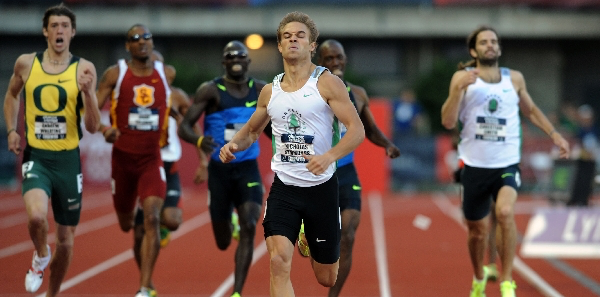
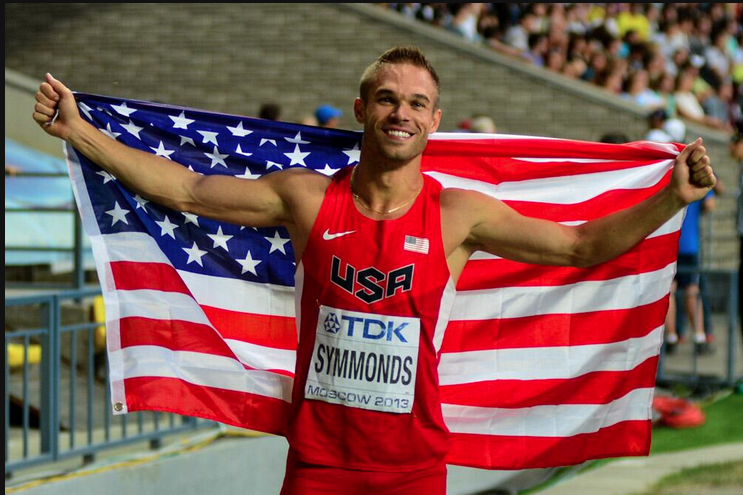
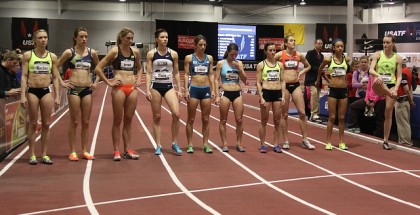














Comments